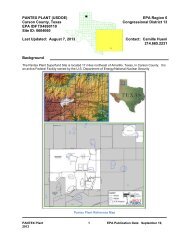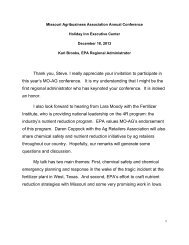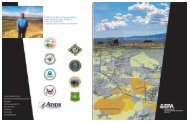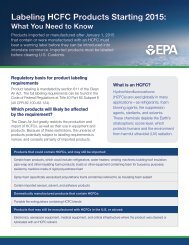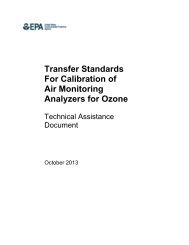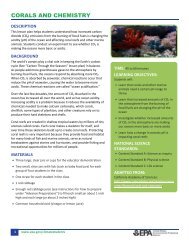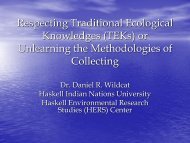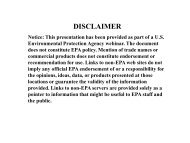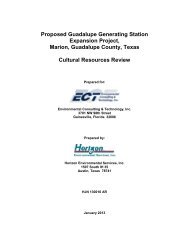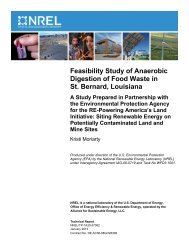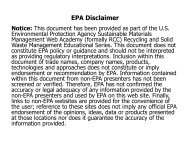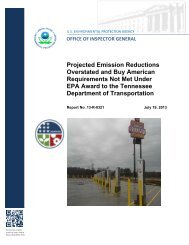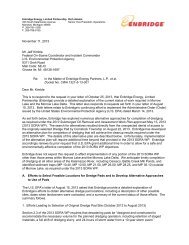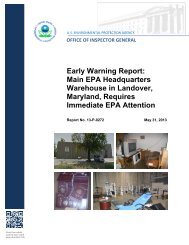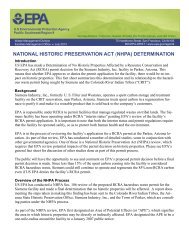Teacher's Guide to Wetland Activities - US Environmental Protection ...
Teacher's Guide to Wetland Activities - US Environmental Protection ...
Teacher's Guide to Wetland Activities - US Environmental Protection ...
Create successful ePaper yourself
Turn your PDF publications into a flip-book with our unique Google optimized e-Paper software.
Ducks Unlimited's <strong>Teacher's</strong> <strong>Guide</strong><br />
X) WETLAND CONSERVATION<br />
Conservation means the wise and sustainable use of natural resources. Discuss this definition with your<br />
students and how it is different from simply setting aside or “preserving” natural resources. Have them<br />
give reasons why conservation is important. Do the students think wetland conservation is important?<br />
List reasons on the board why wetlands should be conserved. Your list might include:<br />
1. They provide habitats for a rich diversity of plants and animals.<br />
2. They help maintain water quality.<br />
3. They provide water s<strong>to</strong>rage areas which can reduce the frequency and<br />
severity of flooding in downstream areas.<br />
4. They offer a variety of recreation and <strong>to</strong>urist opportunities<br />
(canoeing, fishing, birdwatching, hunting).<br />
5. They provide people with food, medicine and materials.<br />
6. They provide people with income through harvesting<br />
plants and trapping.<br />
7. They provide an area for outdoor education.<br />
8. They are areas of scientific interest.<br />
9. They are beautiful!<br />
Now ask the class what might happen if people didn’t care about<br />
wetland conservation? What can private citizens do <strong>to</strong> help<br />
conserve wetlands? Ask the students for suggestions. Possibilities<br />
you<br />
might mention include:<br />
1.<br />
Get involved with Ducks Unlimited, an organization that works <strong>to</strong> create,<br />
protect, res<strong>to</strong>re and enhance wetlands all over the world. The Greenwing program is Ducks<br />
Unlimited’s youth education club which teaches its members about the importance of wetland<br />
conservation.<br />
2. If you are observing plants and wildlife or temporarily bringing them home, remember <strong>to</strong><br />
replace them, unharmed, in their original habitat.<br />
3. Work with landowners <strong>to</strong> fence off sensitive wetland areas from lives<strong>to</strong>ck <strong>to</strong> avoid bank<br />
erosion, plant destruction and excessive disturbance of the muddy bot<strong>to</strong>m.<br />
4. Regulate the harvesting of plants and animals in a wetland. Emphasize wise use and<br />
sustainability for future generations.<br />
5. Prevent pollution since it can seriously affect the existence of a wetland and its inhabitants.<br />
6. Learn more about wetlands and share what you learn with others who still think wetlands are<br />
wastelands.<br />
XI) CONSERVATION ACTIVITIES<br />
Today, people are working cooperatively <strong>to</strong> protect and res<strong>to</strong>re wetlands through conservation efforts.<br />
Ducks Unlimited is people committed <strong>to</strong> wetland res<strong>to</strong>ration, creation, enhancement, and preservation.<br />
The conservation of wetlands is being accomplished in many ways:<br />
1. If a landowner would like <strong>to</strong> ensure that the wetland habitat on their property will be protected<br />
forever, a conservation easement can be placed on the land. This is a binding agreement for all<br />
future owners <strong>to</strong> ensure that the wetland is protected. In some cases Ducks Unlimited leases or<br />
purchases critical habitats.



